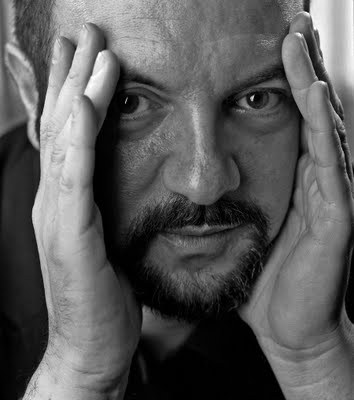
Canadians have a special relationship with Americans and Americans have a special one with the British. As an Argentine I find myself saying often that Italians and Argentines are primos hermanos or first cousins.
It would be impossible to remove the influence of the Italians in Argentina without leaving a void that would not only be so but it would affect the rest of what makes an Argentine and Argentine. From the moment I can remember being a person I would listen to the arguments, the singing and the loud talking of my Calabrian neighbours in my Buenos Aires neighbourhood of Coghlan. They seemed to live in the back garden and that is there where they had their noisy meals. The Calabrians included our neighbourhood barber and his son Miguelito who was my friend. Miguelito was el tano (Argentine Spanish nick name for Italians), I was el inglesito and Mario, our other friend was el alemán. We were all these nationalities and we spoke the appropriate language. But we were all proud of Alfredo di Stéfano (La Saeta Rubia or Blond Arrow) who was an Argentine football player (we thought he was the best in the world at the time) who played abroad (Real Madrid) in the 50s. Both he and Juan Manuel Fangio where the Argentines of Italian extraction that made us proud in a world that still confused Brazil with Argentina and did not know which country spoke Portuguese.
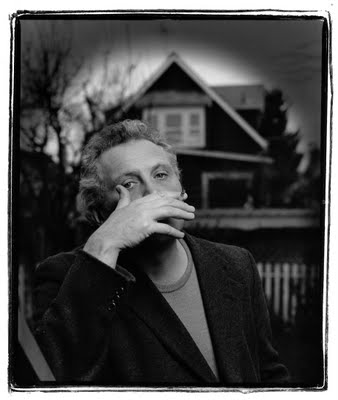
Because so many of our football players seemed to go to Spain or Italy I soon knew the meaning of a word used so often do describe them. The word oriundo (from Latin oriundus) was used every time I would check the soccer scores of the Italian league in the 50s. The word means originally coming from country … and it was used every time I checked the international soccer scores. The name for the Argentine Omar Sívori (he played for Juventus) cropped a lot. Sívori even managed to prove how Italian he was by playing for the Italian National Team in the 1962 World Cup.
Miguelito often told me how at his age 8 or 9 he drank wine (watered down with soda water) with his meals. I had no idea what he was talking about but I remembered him fondly five years ago when Rosemary, Rebecca and I were having pizza at midnight in the Buenos Aires. We were sitting at a sidewalk table on Cabildo (in my old neighbourhood) and I was sipping ice-cold moscato. Rebecca was curious and asked me if she could try it. I didn’t think twice and she had a sip. She thought it was delicious. Since she was 6 I told her not to mention the incident to her other grandmother.
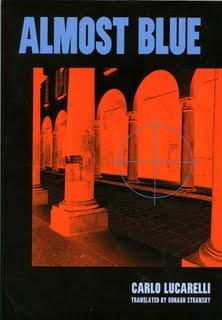
To remove all vestiges of Italian cooking in Argentina would leave us only with sides of beef hanging from meat lockers.
While I have no Italian blood by the very fact that I am Argentine I feel a closeness, a fondness and an interest for all things Italian while I also accept that Argentina is where it is now (and economic disaster) because we inherited the bureaucracy of the English, the Spanish and the Italians.
When I read the many crime novels (by Italians (including a Sicilian), Americans and the British I notice that many involve the constant skillful sidestepping of bureaucracy by our Italian investigators or policemen. I feel quite at home reading about an Italy that is so much like Argentina and so alien to my new home of Canada.
By the time Italian crime/noir writer Carlo Lucarelli (first photo, above, left) came to Vancouver (June, 2002) I had read every Aurelio Zen novel written by the British/Irish writer Michael Dibdin, above, right. Both Dibdin and Lucarelli had a connection with the city of Bologna. Lucareli wrote about the city and Dibdin had taught English there. The usual crime novel expert, Robert Blackwood was not well so Alma Lee (the head of the Vancouver Reader’s and Writer’s Festival) called me to introduce them and to moderate a public lecture featuring the two writers.
It was a pleasure to make an appointment with the both of them (Lucarelli and Dibdin) at a Granville Island restaurant so that the writers could meet and we could discuss the possible theme of the lecture. It was then that both Lucarelli (I had not met him before) and I noticed that Dibdin (I had met him twice before and interviewed him once) was into food, coffee, drink and cigarettes. He was no longer the lean man that was my very idea of what his Venetian-born investigator who worked for the Italian Criminalpol based in Rome, looked like. Dibdin liked food and drink.
Paradoxically just about all the writers of Italian crime novels feature food with the exception of the leaner Lucarelli. Dibdin died 5 years later in Seattle and I have not doubt that it was probably some sort of heart attack.
In the course of investigating a disappearance in The Snack Thief ( Book 3 in the series by Andrea Camilleri) Inspector Monalbano interviews a “well-dressed seventy-year-old lady in a wheelchair.” When the interview is over, the woman invites the inspector to lunch:
“Well signora, thank you so much…”the inspector began, standing up.
“Why don’t you stay and eat with me?”
Montalbano felt his stomach blanch. Signora Clementina was sweet and nice but she probably lived on semolina and boiled potatoes. “Actually, I have much to – “
“Pina the housekeeper is an excellent cook, believe me. For today she’s made pasta all Norma, you know, with fried eggplant and ricotta salata.”
“Jesus!” said Montalbano, sitting back down.
“And braised beef for the second course.”
“Jesus!” Repeated Montalbano.
“Why are you surprised?”
“Aren’t those dishes a little heavy for you?”
“Why?” I’ve got a stronger stomach than any of these twenty-year-old girls who can happily go a whole day on half an apple and some carrot juice. Or perhaps you’re of the same opinion as my son Giulio?”
“I don’t have the pleasure of knowing what that is.”
“He says it’s undignified to eat such things at my age. He considers me a bit shameless. He thinks I should live on porridges. So what will it be? Are you staying?
“I’m staying,” the inspector replied decisively.
My favourite writers of crime novels based in Italy are Michael Dibdin (British/Irish with a short residence in Vancouver), Donna Leon (New Jersey), Iain Pears (England), Carlo Lucarelli and of late the Sicilian Andrea Camilleri. This latter writer I have known for some time but I chose to ignore the fact and I had never read a novel of his until most recently.
I finally discovered Andrea Camilleri by two unconnected events that include my bass playing neighbour Patricia Hutter and my friend John Lekich.
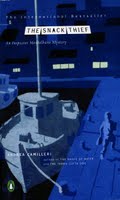
The former has borrowed all my Donna Leon and Michael Dibdin books. She has gone crazy for things Italian (a sample of this endearing craziness is the money she must have spent to buy her 17th century Italian bass, Nicolo). A couple of weeks ago, knowing that I share her love for all things Italian she left at my front door The Snack Thief by Andrea Camilleri.
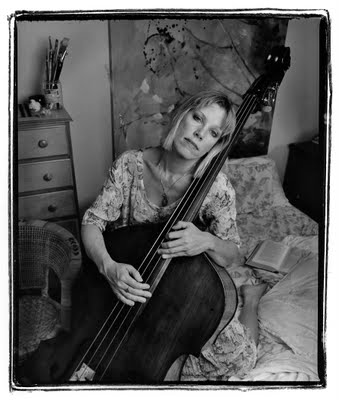
A few days later I invited my friend John Lekich to attend a screening of an episode of Il Commissario Montalbano which is an extremely successful Italian TV series. There have been 18 of them starting in 1999. The Istituto Italiano di Cultura Vancouver has been screening these series from June to September. I somehow caught on before the last screening last Tuesday that the Montalbano TV series was based on the crime novels of Andrea Camilleri.
Of the TV installment (1 hr, 45 minutes) that John Lekich saw I can only stress that it was better than anything from England including the Inspector Morse series.
Somehow I will have to find a way of acquiring the other 17 in the series and Perhaps Patricia, Nico and I can watch them.
Addendum:
The scan featuring the inside cover page of a book, called Carretera Central – “Vía Emilia” featuring stories by Bologna-based Italian writers (translated into Spanish) including one by Carlo Lucarelli. The book was given to me by Lucarelli who was delighted to know that I spoke and read Spanish. The dedication mentions a refrigerator. Let me explain. For many years when I photograph people I always give them at least one Polaroid. I always tell them to stick it their refrigerator with a fridge magnet. Polaroids are no longer made but I sometimes use a Fuji version which I affectionately call a Fujiroid. Perhaps soon some subject of mine might remember me because of one.
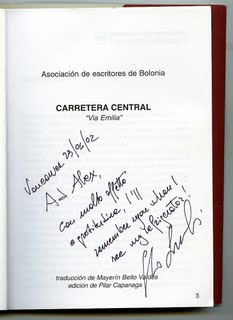
As for The Snack Thief by Andrea Camilleri (which features Inspector Montalbano) what I can I possibly add to the equivalent pleasure of suddenly discovering Reginald Hill’s (10 plus novels) and having the opportunity to read them all one after another?
And finally it is almost impossible not to be tempted by the almost weekly cultural offering (most often free, too) by the Istituto Italiano di Cultura Vancouver. It is preposterous that Great Britain, the US and France all have a much smaller cultural presence in Vancouver. How do these Italians do it? Where do they get their funding? And they have been doing it for a long time. Read the previous post called The Italians Part I
Istituto Italiano di Cultura Vancouver






